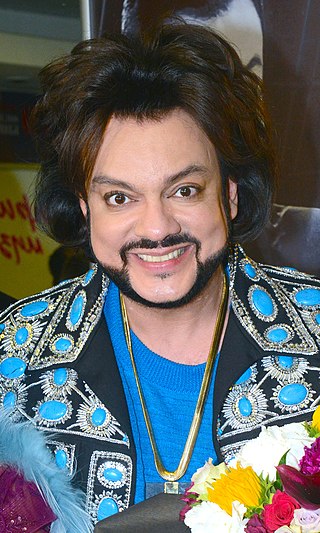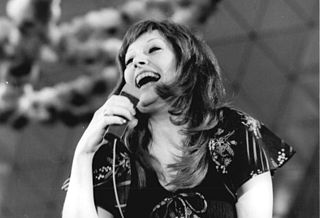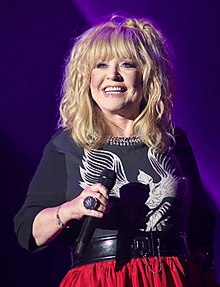
Alla Borisovna Pugacheva is a Soviet and Russian musical performer. Her career started in 1965 and continues to this day, even though she has retired from performing. For her "clear mezzo-soprano and a full display of sincere emotions", she enjoys an iconic status across the former Soviet Union as the most successful Soviet performer in terms of record sales and popularity.

Russia has participated in the Eurovision Song Contest 23 times since their debut in 1994. Russia won the 2008 contest with Dima Bilan performing the song "Believe". One of the most successful countries in the contest in the 21st century with a total of ten top five placements, Russia finished second with Alsou in 2000, Dima Bilan in 2006, Buranovskiye Babushki in 2012 and Polina Gagarina in 2015; third with t.A.T.u. in 2003, Serebro in 2007, Sergey Lazarev in 2016 and 2019, and fifth with Dina Garipova in 2013. In 2018, the country failed to qualify for the final for the first time in its history. The Russian entry has been chosen through both internal selections and a televised national final titled Evrovidenie, with its most recent entry (2021) being chosen by the latter.

Philipp Bedrosovich Kirkorov PAR is a Bulgarian-born Russian pop singer. He is a five-time winner of the "Best Selling Russian Artist" title at the World Music Awards ceremonies.
Russia participated in and hosted the Eurovision Song Contest 2009 in Moscow after winning the Eurovision Song Contest 2008 with the song "Believe" performed by Dima Bilan. The Russian entry was selected through a national final, organised by the Russian broadcaster Channel One Russia (C1R). Anastasia Prikhodko represented Russia with the song "Mamo", which scored 91 points in the final and finished in 11th place.
Russia participated in the Eurovision Song Contest 2002 in Tallinn, Estonia. The Russian entry was selected internally by the Russian broadcaster Russian Public Television (ORT). Prime Minister represented Russia with the song "Northern Girl", which placed 10th and scored 55 points at the contest.
Ukraine participated in Eurovision Song Contest 2010 with the song "Sweet People" written by Borys Kukoba, Vadim Lisitsa and Olena Kucher. The song was performed by Alyosha, which is the artistic name of singer Olena Kucher.
Russia participated in the Eurovision Song Contest 2011 in Düsseldorf, Germany, selecting their entry internally. This was the country's fifteenth participation in the contest after debuting in 1994.
Russia debuted in the Eurovision Song Contest 1994, held on 30 April 1994 at the Point Theater in Dublin, Ireland. The Russian broadcaster RTR organised a public selection process to determine its entry for the contest. Held on 12 March 1994 in Moscow, the event saw nine songs compete to be the Russian entry; the results were determined by the jury panel. The song "Vechny strannik", written by Lev Zemlinski and Piligrim, and performed by Youddiph received the most votes and was selected to represent the nation. Russia performed 23rd out of the 25 countries competing in the contest and at the close of the voting process, finished in 9th place, receiving 70 points.
Russia participated in the Eurovision Song Contest 2000, held on 13 May 2000 at the Globe Arena in Stockholm, Sweden. Public Russian Television (ORT) returned to the Eurovision Song Contest after a two-year absence following their relegation in 1998. ORT first announced that the Russian entry for the 2000 contest would be chosen through a televised national final. However, the broadcaster later opted to choose the nation's representative internally. The song "Solo", written by Andrew Lane and Brandon Barnes and performed by Alsou, was internally selected to represent the nation.
Russia participated in the Eurovision Song Contest 1995 in Dublin, Ireland. The Russian broadcaster Russian Public Television (ORT) internally selected Philipp Kirkorov with the song "Kolybelnaya dlya vulkana", written by Ilya Bershadskiy and Ilya Resnik, to represent the nation. Prior to Kirkorov's selection, ORT organised a public selection process to select Russian entrant. While the event did take place, the jury could not decide on the winner of selection and ultimately opted to choose the artist internally. Vocal Band were selected to represent Russia, however ORT later withdrew the band as the Russian representatives due to the band members being unable to finance their participation. Kirkorov was selected and announced as the Russian representative on 29 April 1995, while his contest song "Kolybelnaya dlya vulkana" and its accompanying music video was premiered on 30 April. Russia was drawn to appear sixth in the final, which was held on 13 May. In the final, the nation placed 17th with 17 points.
Russia participated in the Eurovision Song Contest 2001 in Copenhagen, Denmark. The Russian entry was selected internally by the Russian broadcaster Russian Public Television (ORT). Mumiy Troll represented Russia with the song "Lady Alpine Blue", which placed 12th and scored 37 points at the contest.
Russia attempted to participate in the Eurovision Song Contest 1996 in Oslo, Norway. The Russian entry was selected through a national final, organised by the Russian broadcaster Rossiya Channel (RTR). Andrey Kosinsky was chosen to represent Russia with the song "Ya eto ya". However, Russia was one of seven countries which failed to qualify for the Eurovision final from a pre-qualifying round, so they were not present in Norway.

This is the full discography of Soviet and Russian singer Alla Pugacheva, which consists of:
Russia participated in the Eurovision Song Contest 2016 with the song "You Are the Only One" written by Philipp Kirkorov, Dimitris Kontopoulos, John Ballard and Ralph Charlie. The song was performed by Sergey Lazarev who was internally selected by the Russian broadcaster All-Russia State Television and Radio Broadcasting Company (VGTRK) to compete at the 2016 contest in Stockholm, Sweden. Lazarev's appointment as the Russian representative was announced on 10 December 2015, while the song, "You Are the Only One", was presented to the public on 5 March 2016.
Russia announced its participation in the Eurovision Song Contest 2017, in Kyiv, Ukraine. The Russian broadcaster Channel One Russia organised their entrant internally. Russia was planned to compete in the first half of the second semifinal on 11 May 2017, until the announcement of their withdrawal on 13 April 2017.
Russia participated in the Eurovision Song Contest 2019 with the song "Scream", written by Philipp Kirkorov, Dimitris Kontopoulos and Sharon Vaughn. The song was performed by Sergey Lazarev, who was internally selected by the Russian broadcaster Russia-1 to represent the nation at the 2019 contest in Tel Aviv, Israel.

Zerkalo dushi is the debut studio album by Russian soviet singer Alla Pugacheva released in the USSR in February 1978. Later the album was released as two separate records.
Russia participated in the Eurovision Song Contest 2021 in Rotterdam, the Netherlands. The Russian broadcaster Channel One Russia (C1R) organised a national selection to determine the Russian representative. As of 2023, this was Russia's final entry at the contest, before the country was excluded the following year.
Moldova participated in the Eurovision Song Contest 2021 with the song "Sugar" written by Dimitris Kontopoulos, Philipp Kirkorov, Mikhail Gutseriyev and Sharon Vaughn. The song was performed by Natalia Gordienko, who was internally selected in January 2021 by the Moldovan broadcaster TeleRadio-Moldova (TRM) to represent the nation at the 2021 contest in Rotterdam, Netherlands. Songwriter Philipp Kirkorov represented Russia in the Eurovision Song Contest 1995 with the song "Kolybelnaya dlya vulkana" where he placed seventeenth, while Natalia Gordienko had previously represented Moldova in the Eurovision Song Contest in 2006 together with Arsenium and Connect-R, placing twentieth with the song "Loca", and was due to compete in the 2020 contest with "Prison". The Moldovan song, "Sugar", was presented to the public on 4 March 2021.
Evrovidenie. Nacionalny Otbor, Nacionalny Otbor na Evrovidenie or simply Evrovidenie was a Russian televised musical competition organized by Russian public broadcasters Channel One in odd years and Russia-1 (RTR) of VGTRK in even years. The competition is used to select Russia's representative in the Eurovision Song Contest. Since 2005, it has been streamed live online through the respective websites of the broadcasters. Throughout its history, the competition has been held using different names, including Evrovidenie "Pesnya-95" (1995), Pesnya dlya Evropy (1996), Evrovidenie – Vybirayet Rossiya (2005), Kto? (2014), but has been known for most of its history as Evrovidenie. Nacionalny Otbor.






